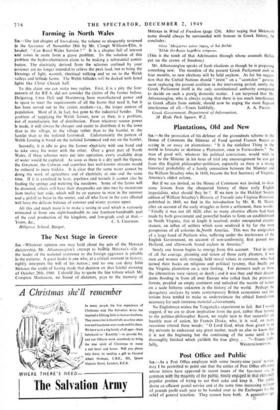Plantations, Old and New
SIR.—As the peroration of his defence of the groundnuts scheme in the House of Commons the Minister of Food quoted Francis Bacon as saying in an essay on plantations: " It is the sinfullest Thing in the world to foresake or destitute a Plantation, once in Forwardness." No man of good will, whatever his political convictions, would wish to deny to the Minister in his hour of trial any encouragement he can get from this English philosopher-politician, especially as there is a strong historical probability of a family connection between the Minister and the William Strachey who, in 1610, became the first Secretary of Virginia, America's oldest colony.
But if we are invited, as the House of Commons was invited, to draw some lessons from the chequered history of these early English imperialists, what should 'they be ? If we turn to the Hakluyt Society edition of William Strachey's Historie of Traraile into Virginia Britannia. published in 1849, we find in the introduction by Mr. R. H. Major, after an account of the early struggles to form a settlement, these words: "Finally it was not till 1620, after so many abortive efforts had been made by both government and powerful bodies to form an establishment in North Virginia, that at length it received, under unexpected circum- stances, an influx of settlers which soon rendered it by far the most prosperous of all colonies ita„North America. This was the emigration of a large band of Puritans who, suffering under the intolerance of the English Government, on account of non-conformity, first passed into Holland, and afterwards found asylum in America."
Surely one lesson begins to emerge from this account. That in spite of all the courage, planning' and vision of those early planters, it was men and women with strongly held moral values in common, who had turned their backs on religious and political tyranny, that finally put the Virginia plantation on a sure footing. For pioneers such as those the alternatives were victory or death ; and it was they and their descen- dants flooding in from all over Europe who rolled back the primaeval forests, peopled an empty continent and unlocked the secrets of nature on a scale hitherto unknown in the history of the world. Perhaps the derogatory analyses by some contemporary British economists and his- torians have tended to make us underestimate the ethical foundations necessary for such immense material achievements.
No Englishman wishes the Tanganyika experiment to fail. But I would suggest, if we are to draw inspiration from the past, rather than turning to the politico-philosopher Bacon, we might turn to that successful yet humble man of action, Sir Francis Drake, who, it is said, on ma) occasions uttered these words: " 0 Lord God, when thou givest to us thy servants to endeavour any great matter, teach us also to know that it is not the beginning but the continuing of the same until it he thoroughly finished which yieldeth the true glory. . . ."—Yours faith'


































 Previous page
Previous page